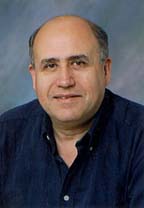|
||||
 |
Freydoon
Shahidi Abstract: Considering these cases, it is possible to prove the conjecture using a form of converse theorems of Cogdell and Piatetski-Shapiro. This is a powerful method, dating back to Hecke which allows one to prove a representation of GL(n) is automorphic, i.e., it appears in the space of square-integrable functions on the quotient of adelic GL(n) by its rational points, if certain analytic (zeta) functions (L-functions) attached to it satisfy a number of properties such as being entire with bounded growth on finite vertical strips, satisfying standard functional equations. Professor Shahidi will show how in the cases of interest (symmetric powers of GL(2)), L-functions can be attached to each transfer and prove the required analytic properties, so as to apply converse theorems mentioned above. The main tool will be the method initiated by Langlands and pursued by Shahidi since the late Seventies. The lectures will conclude by displaying similar techniques that can
be employed to transfer certain automorphic forms on classical groups
(generalizations of Siegel modular forms) to GL(n). Freydoon Shahidi is a basic contributor to the portion of the arithmetic theory of automorphic forms known as The Langlands Program. Over two decades he has systematically developed a powerful and difficult representation -theoretic approach to the analytic theory of L-functions. Indeed, this area of research is now known as the Langlands-Shahidi method. Shahidi is today very much in limelight for his recent work with H. Kim. Together, they have very surprisingly pushed his method much further than was thought possible. In particular, he has proven, using the also rapidly developing Converse Theory of Piatetski-Shapiro et al., long-sought instances of "Langlands Functoriality". These had been believed inaccessible, and they have striking consequences for central conjectures of number theory. These applications concern especially improved estimates toward the Ramanujan-Petersson and Selberg Conjectures, and the Sato-Tate Conjecture, and the proof of new cases of Artin's conjecture. At UCLA, Professor Shahidi will give a Colloquium and 2 Seminars with the goal of explaining his methods and these consequences. Shahidi is Professor of Mathematics at Purdue University. He was appointed Clay Mathematics Institute Prize Fellow in 2000. This year he was awarded a John Simon Guggenheim Memorial Foundation Fellowship. He has been a Fellow of the Japan Society for Promotion of Science since 1993. His recent work was presented in the Seminaire Bourbaki in Paris last year, and it has been the subject of intensive seminars in several other places, such as the Institute for Advanced Study in Princeton. His work was mentioned by three plenary speakers at the American Mathematical Society's "Mathematical Challenges of the 21st Century" (summarizing the fundamental achievements of 20th century mathematics). Professor Shahidi is an invited speaker for the 2002 ICM in Beijing. |
||||
|
|
|
|
People | Seminars & Colloquia | News | Media Page | UCLA Department of Mathematics For questions or comments please contact webmaster@math.ucla.edu |
